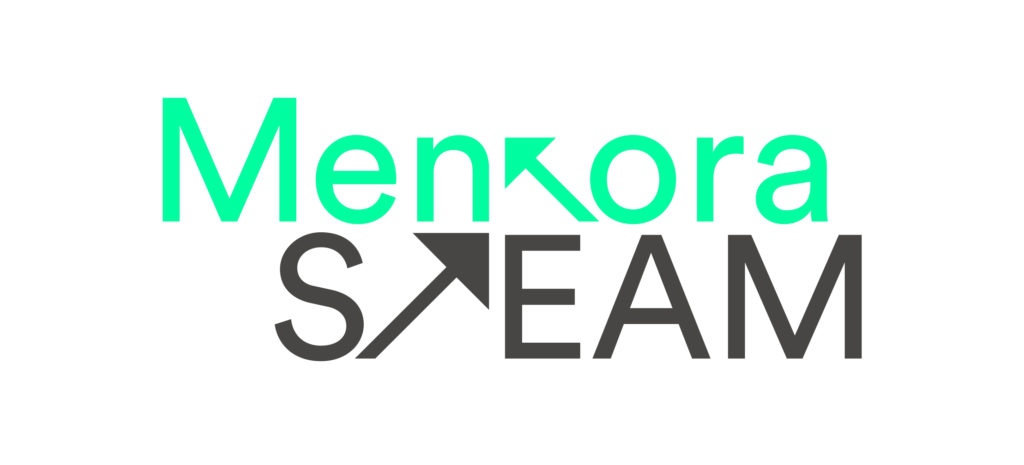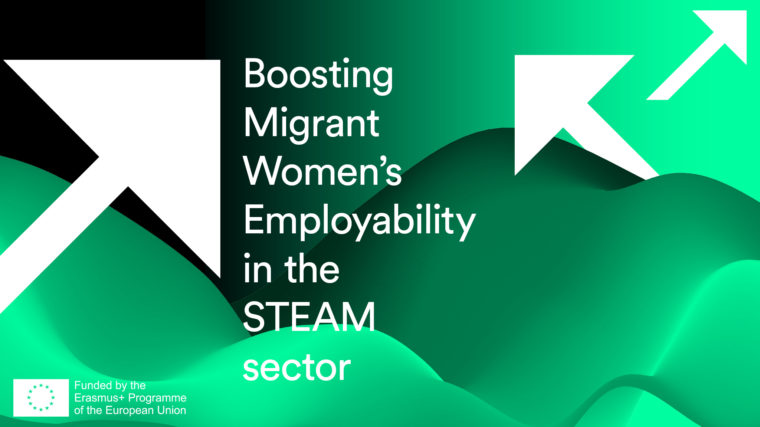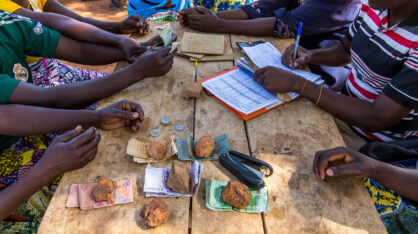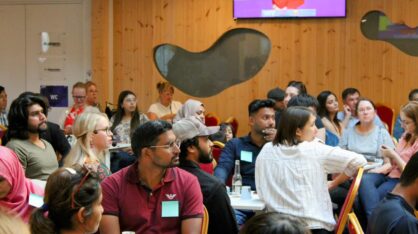Addressing challenges and inequities faced by migrant women in STEAM fields
MentoraSTEAM (2020-2023) is an EU funded Erasmus+ project that aims to develop highly skilled migrant women’s self-efficacy, confidence and soft skills in the STEAM (Science, Engineering, Arts and Technology) sector in order to boost employability. Women are underrepresented and face a gender gap globally (World Economic Forum, 2020). In Europe, 41% of scientists and engineers and 17.2% of ICT specialists are women (Eurostat 2018). Migrant women in particular tend to have lower self-efficacy, especially in STEAM sectors (Tellhed et al, 2016; Gjersoe, 2018).
Eurostat 2018 statistics reveal that migrants tend to have higher levels of educational achievement than native-born peers in many countries. Even so, many find difficulty in getting hired for positions that match their competences. Migrant women in STEAM fields often face underemployment and deskilling. When they are hired, often it is for positions for which they are overqualified. Initiatives to boost women’s confidence have been shown to encourage them to pursue and continue in careers in STEAM fields (Perez-Felkner, 2018).
MentoraSTEAM will deliver specialised training and mentorship to assist these women and help them to thrive in their chosen STEAM sectors. Partner organisations in four countries, including VAMK’s Muova unit in Finland, have met with focus groups comprised of highly skilled migrant women trained and/or working in STEAM fields. Case studies were collected to demonstrate the challenges these women face to policy makers, employment agencies, labour unions, business organisations and other stakeholders.
Focus group members in Finland
In Finland, VAMK interviewed seven migrant women with STEAM backgrounds. Participants living in Finland came from six different countries: Indonesia, India, Vietnam, Iran, Hungary and Ethiopia. Three participants were currently employed, two participants were in traineeships and two were students.
Participants self-described themselves as:
- an entrepreneur in microbiology with a PhD in microbiology.
- a data analyst who had studied international business, yet always expressed her enthusiasm for technology and engineering and whose first position was engineering researcher.
- an intern studying programming who used to study in an arts field.
- a chemical engineering PhD student.
- an engineer who had studied electronics engineering, had a solid 7-8 years’ work experience before moving to Finland and was a researcher in medical engineering, science and more.
- an engineering student who had an internship in the field a previous year and was looking forward to her Master’s degree in AI.
- a research intern who completed two Master’s degrees in Finland and was interested in STEAM sectors.
Common concerns raised in the European focus groups
Similar focus groups convened in the partner countries. Reponses showed a combination of individual circumstances and shared or common experiences.
Participants experienced gender discrimination to differing degrees in all four countries. Discrimination for migrant status in employment searches was also perceived by participants in Finland and Italy. In Italy and Spain getting professional qualifications recognized was a major hurdle. Participants in Finland also experienced challenges getting degrees and other credentials from their home countries validated in Finland. Participants in the UK faced significant obstacles with visa and work permit requirements and lack of sympathy and understanding from employers.
Lack of Finnish language skills can be a barrier in Finland
In Finland, lack of Finnish language skills and discrimination against migrant backgrounds were cited as the most common barriers.
One participant stated that employers and companies will require applicants and employees be fluent or nearly fluent in Finnish even for positions that do not require language skills. Two other participants also indicated that the most common reason given to them by employers when they are not selected for a position is that they do not have enough language skills. One reported that she reached C1-level fluency in Finnish, and was still rejected for jobs without any further explanation.
Outsider status is a challenge for migrants in Finland
Members of the focus group in Finland perceive that there is a lack of trust from stakeholders, such as employers, businesses and society towards them as migrants and migrant women in particular. They believe this is due at least in part to the strong trust that exists between Finnish citizens. This strong communal cohesion can be seen in a much higher preference in hiring Finnish citizens over migrants.
Sexism can still be found in STEAM fields
Migrant women in STEAM fields face the additional challenge of discrimination in male-dominated fields during recruitment and working life. Outdated ways of thinking that women are not as capable of doing STEAM tasks or do not contribute as significantly as men linger in some industries and workplaces.
Importance of stakeholder involvement
The focus group members in Finland cited a lack of stakeholders’ involvement and commitment which they believe impacts migrants in general and their opportunities for employment. The employment challenges for migrants, particularly migrant women in STEAM, cannot be solved solely by migrant women themselves. One participant said that it is unsatisfactory and unfair that migrants are always told to develop their job competences further without knowing accurate expectations from employers and whether there is any guarantee that they are going to be hired after obtaining the competences. More clarity in communication and access to information in English and other languages are needed.
Needs identified by the four focus groups
The small sample size of 23 women from four countries does not give a general overview, but reflects much of what is already known about the struggles of migrant women seeking employment in STEAM fields in European countries. Highly skilled migrant women in STEAM fields:
- face double minority bias as migrants and women in male-dominated fields as they are sometimes believed to be not as smart or capable as men in STEAM fields.
- are an underserved population in Europe, few in number, and have unique needs.
- want assistance navigating bureaucracy in their host countries; need information and support to obtain residency and work permits, get their degrees and certifications officially acknowledged, and country-specific training for employment searches and adapting to their host country’s work culture.
- may face ethnic prejudices or biases that impede their abilities to find suitable employment for the level of their training, experience and skills.
- may encounter gender bias from employers because they may need time off for maternity and family.
- Many need support learning the host country’s language.
- Often, they have or plan to have children and need resources for childcare and family support.
What MentoraSTEAM aims to do
MentoraSTEAM trainings target this specialised demographic of highly skilled migrant women. Information and suggestions collected in the four focus groups will refine the planned activities of the project. Specific national needs and preferences will be honoured. Training in soft skills, entrepreneurship, language skills, and information support and consultancy will empower these women to face the challenges specific to being migrant women in STEAM fields.
Additionally, the focus groups made clear that the public sector, individual businesses, educational institutions, communities and NGOs have a role to play supporting migrant women in STEAM. The level of assistance is not yet where it needs to be. More should be done to support these highly skilled migrant women who have the potential to positively enhance the workforce and work culture of their new home countries.
Employability Booster Training Programme
VAMK’s Muova unit is creating the Employability Booster Training Programme programme for migrant women in STEAM for MentoraSTEAM. This will consist of 4 modules, a Facilitators’ Guide and Learners’ Pack.
The training will help migrant women in STEAM fields to plan and recognise the steps necessary to reach their professional goals and to adapt to a new host country. It encourages women to explore opportunities that may lead to permanent employment in the STEAM sector, such as work-related programmes, training, education, job shadowing or volunteering.
Final take-aways from the focus groups
Training migrant women will empower them to better face obstacles and reach their goals. They, however, cannot overcome the biases of others entirely through their own efforts. They would appreciate mentors who may have backgrounds similar to their own. Focus group participants also desire participation and collaboration from representatives of public entities, businesses, and their communities. They would like advocates. An invitation for participation and collaboration could be extended to these entities through the MentoraSTEAM project.
Highly skilled migrant workers add value to their adopted country’s workforce. These are often younger adults who will contribute many years as productive workers. Host countries should appropriately guide these new arrivals and help them to find their place in their new countries.
STEAM fields need greater gender diversity. Migrant women trained in STEAM fields are a resource to help businesses increase diversity and thereby their potential for innovation and sustainability.
More about MentoraSTEAM
MentoraSTEAM is led by Inova Consultancy, in the UK; INCOMA, in Spain; MEET Digital Culture Center, in Italy; and VAMK University of Applied Sciences, in Finland. VAMK’s Muova unit is in charge of the Employability Booster Training Programme.
Website in English: https://mentorasteam.eu/en/
Verkkosivuston osoite suomeksi: https://mentorasteam.eu/fi/





